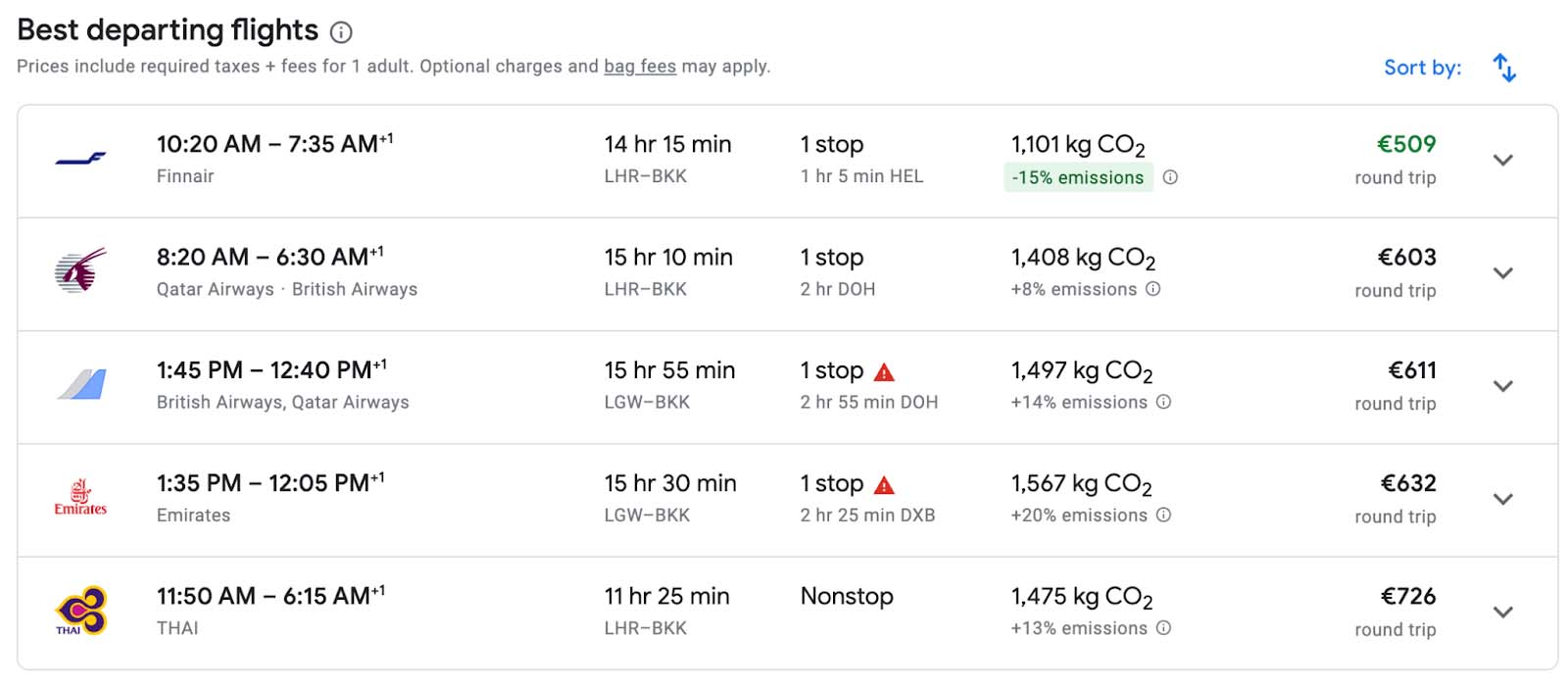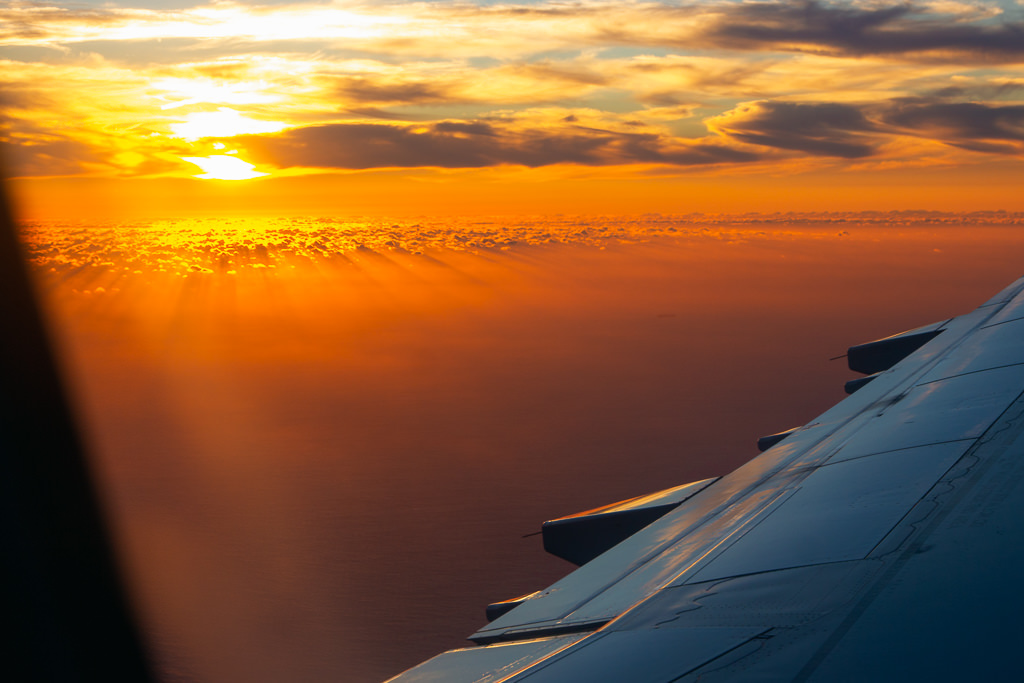While the issues with unsustainable travel are quite well-documented, I think — knock on wood — things are actually getting a bit better.
Sustainable travel tips
- Find lower-emission flights using Google Flights
- Travel overland when possible
- Use the new Booking.com filters to find eco-friendly accommodation
- Support wildlife preservation through ecotourism
- Rent an electric car for your road trip
Despite some slow progress, travelling in more sustainable ways is getting easier. As travellers we have more ways to reduce our environmental impact, while more tourism companies are making the necessary changes to decrease their carbon footprint.
There’s always doom and gloom in the news around climate change, often rightfully so. While I believe most of the onus is on governments and companies, there are still things every traveler can do to make a difference within the system we have.
1. Choosing better flights
Aviation contributes hugely to carbon emissions, and for all sorts of reasons, it is a challenge to make it environmentally friendly right now.
Not every flight emits the same levels of carbon, however. This means that we, as travellers, can choose a less polluting flight.
It’s become a lot easier to make informed decisions regarding the environmental impact of flights. For instance, try searching with Google Flights, and you will see an estimate of the CO2 emissions for every flight option.

You can also narrow your Google Flights search to display “low emissions only”. (It’s under the ‘Emissions’ button in the flight overview.)
According to Google, these calculations are made using a combination of factors, such as “the distance of a trip, the number of stops, the number and class of seats on board, the type of aircraft and data from the European Environment Agency.”

Direct flights are usually better options, as relatively speaking, most emissions come from take-off and landing. The aircraft type is also a big factor as the more fuel-efficient planes emit less CO2 than old kerosine guzzlers.
2. Travelling overland
So much attention is placed on how bad flying is for the climate that we don’t talk enough about just how good overland travel is.
Rail, in particular, is just a mind-blowingly low-carbon option. In fact, high-speed rail is the most efficient form of transport that humanity has come up with… by far.
For starters, it uses very little energy per passenger. According to the book Energy by Vaclav Smil (uhh, okay, I’ve been reading some very nerdy books), a French TGV can move people around using less than 0.4 MJ/p-km (the energy used per passenger per kilometre). This figure is about 2 MJ/p-km for jet airlines.
That’s a whopping five times better, but that’s just the base efficiency. The difference becomes much greater when putting it in terms of carbon emissions.
Here are some stats from ThisWorldInData:
This chart, which is based on UK government data, shows that taking the Eurostar high-speed rail is 42.5 times (!) less carbon-intensive than taking a domestic flight.
That’s NUTS.
This makes me wonder: why are we not talking more about the sheer miracle of high-speed rail?!
While flying may be the only practical or convenient option for some trips, it’s great news that overland travel options are increasing. In Europe, rail is even undergoing a renaissance of sorts at the moment. New high-speed rail and international (overnight) connections are popping up left, right and centre. It is also getting easier to book tickets, though sadly, the prices are still often not competitive with budget airlines.
Even knowing the statistics, I must admit that I’m not exactly 42.5 times more likely to take a train. However, knowing just how efficient trains are makes me even happier to use them wherever possible.
3. Staying in eco-accommodation
Another way of reducing our impact on the environment is choosing accommodation that cares about water and energy use, waste disposal, food sourcing, and other such aspects.
It’s wonderful that increasing numbers of hotels, hostels and eco-lodges are prioritising sustainability.
But how do you find them?
Honestly, sometimes just looking for places with an eco or hippie vibe does the trick. Looking at the pictures or descriptions can usually give you a lot of information. Maybe the place uses solar panels, serves breakfast with veggies from the garden or just gives the overall impression that it might be eco-conscious. Many booking sites can also help you specifically find places advertised as eco-lodges or eco-resorts.

But not all sustainability-minded places make it quite so obvious, which is why it’s great to use search filters.
For example, Booking.com has introduced a sustainability badge for hotels. This badge is based on various measures regarding waste, energy and greenhouse gases, water, supporting local communities and protecting nature. It’s very subtle, but you can see these establishments labelled as a “Travel Sustainable property”.

This label appears among the listings, but you can also search for them using filters:

Issuing the badge is based on self-assessment surveys, so it may not be a completely watertight system. However, any property that claims to be sustainable but isn’t would surely suffer bad reviews, so I believe this badge gives a useful indication.
There are now also several levels of sustainability indicated on Booking, which can motivate a property to improve over time. This might involve installing solar microgrids, solar water heaters, or ensuring that the food for guests is locally sourced.

Google Travel also recently introduced its own eco-certified badge. It’s awarded to hotels that were “certified as environmentally sustainable by an independent organisation recognised by Google”. Hopefully, more travel platforms will follow suit.
While I haven’t used them, there are booking sites specifically for eco-accommodation, such as Nature.house or Ecobnb, which awards 1 to 5 leaves on a range of eco criteria.
4. Supporting ecotourism
Ecotourism is another way to make an impact. This won’t necessarily negate the overall environmental impact of your trip, but ecotourism does play a crucial role in protecting nature and preserving biodiversity.
Ecotourism is essentially any kind of tourism that benefits the environment and the local people. Safaris are often one of the first things that spring to mind, but there are many other examples. I would consider scuba diving, whale-watching, hiking, rock climbing, and canyoning all to be ecotourism as well (if done responsibly).

Some of my experiences over the past few years brought into focus just how much ecotourism can help communities live from nature rather than from destroying it. For instance, on a wildlife tour in Cambodia, I got to know some of the park rangers. Many of them had literally been loggers and poachers before the local ecotourism project had started. They were now proud to be making a living protecting nature instead of exploiting it — and it’s tourist money that contributes the largest portion of their salaries.
Of course, some people will argue that ecotourism is ‘hypocritical’ if you have to fly a long way to get there. But I think that’s missing the big picture. Taking the long view, while there’s still time to make aviation more sustainable, protecting the wilderness and biodiversity we have left feels like the more immediate challenge.
So, if you decide to fly to Costa Rica to see some sloths and monkeys, I think that’s awesome! Actually, thanks to ecotourism income, the forests in Costa Rica have been growing for several decades.
5. Choosing electric
It’s 2023 and there aren’t that many EVs on the road yet, but it’s safe to say that gas and diesel cars are now officially among the ancient dinosaurs of technology — and it’s just a matter of time until they are replaced.
It won’t be long before you can easily rent an electric car on your next holiday. But wait, is that truly a good thing?
Some still doubt and dispute that electric cars are better for the environment, since companies making traditional cars like to sow doubt and confusion.
I’ve had the chance to learn about this topic a lot. While it takes more CO2 emissions (currently) to make a car with batteries and an electric drive, it’s quickly compensated for by their incredible efficiency.
Even if you power an EV using electricity from a dirty coal plant rather than renewable energy, it’s still a big improvement. In a typical petrol car, only about 25% of the fuel energy is actually used to move the car, while the rest is lost as heat. That’s kinda nuts! EVs don’t have this problem.
EV’s also need less maintenance, last much longer, and their batteries are almost completely recyclable at their end of life.
Okay, maybe you’ll struggle to find an EV if you’re travelling in Sri Lanka or Bolivia, but they’re increasingly an option in more developed destinations.

For proof that it’s already possible to travel around the world in electric vehicles, just watch the wonderful series The Long Way Up. In this documentary, Ewan McGregor and Charlie Boorman travel from the southern tip of Argentina to LA using electric motorbikes and electric cars.
6. Reducing waste
Travelling wastefully or excessively is obviously less sustainable. Taking long showers during your stay will affect resource demand, especially in a destination where water is scarce. Using a refillable water bottle is also clearly preferable to using single-use plastic bottles all the time. These containers can quickly add up, particularly in tropical countries where you might go through several bottles a day.
I think the idea of being less wasteful can also be extended to the overall trip. Taking flights for three separate weekend trips is wasteful compared to flying somewhere and staying a week. Longer and slower travel can thus reduce the overall waste level if you average out your impact across all travel days.
7. Compensating your emissions
Finally, it is possible to offset the CO2 emissions of your trip. Such offsets will pay for, say, having trees planted or solar panels installed. You’ve surely heard of such offsetting initiatives, though they are not without some controversy, as it’s hard to say for sure how effective the offsets are.
Personally, I now feel it may be better to choose companies that have pledged to offset CO2 emissions for every customer across the board rather than to leave it up to the individual to do it.
There are also some more direct ways to compensate for emissions in your own life. It’s already quite easy to choose to eat less meat, choose electricity for your home from renewable sources, or support charities actively working on nature conservation.
When it comes to election time, you can choose to vote for political parties that support strong environmental policies—possibly the best ‘offset’ you can make.
A sustainable future for travel?
All in all, I think just in the past five years, there has been so much progress in sustainability.
Expecting every traveller to be a complete purist when it comes to their travel impact is probably not so realistic. Unless you choose to walk the Earth and never use a vehicle of any kind, it’s hard to do everything 100% sustainably. But I do think each traveller making small changes and more mindful choices can have a big impact taken together, which also give the right kind of signals to companies and governments with bigger levers to pull.
Everyone can help out by choosing lower-impact forms of travel that are better for the planet, better for the destination and often more fun too!
Some links may be affiliate links, meaning I may earn commission from products or services I recommend. For more, see site policies.







Hi Marek, Very interesting content, I always think about traveling without pollution, But all my travels are on budget so i need cut cost. some times eco friendly hotels & resorts are very costly, but i will prefer to make such nature friendly travel. Thanks for remember this. many one likes me avoiding such things.